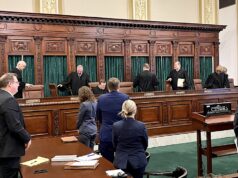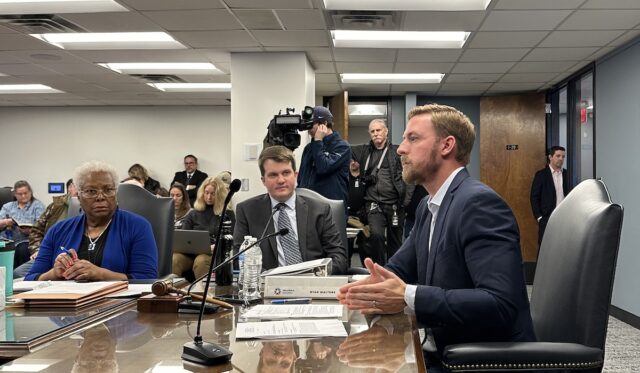

Happy 2024, #oklaed.
As a new year begins, a number of stories from across the world of Oklahoma education that have been ongoing for months or years have seen recent developments. Below, find an Oklahoma education roundup featuring updates on court cases, State Department of Education programs and bills filed for the 2024 legislative session.
Ron Arthur lawsuit moving forward
A federal lawsuit against Shawnee Public Schools and former athletic director Ron Arthur — who was found guilty in November of sexting a minor — will move forward after a judge on Dec. 29 declined in part and granted in part a motion to dismiss.
The plaintiff, identified only as John Doe in the lawsuit, alleged that Arthur sexually harassed him and that the district knew of Arthur’s misconduct.
“Essentially, the amended complaint asserts that the district’s negligence and deliberate indifference in the face of prior complaints caused plaintiff to become another victim of Arthur’s sexual misconduct,” U. S. District Court Judge David Russell for the Western District of Oklahoma summarized at the beginning of his order.
Russell dismissed without prejudice the plaintiff’s Title IX claim, as well as another claim that the district should be held responsible for the actions of a third party because it “created danger” for the victim. Russell also dismissed the plaintiff’s claim that the district was negligent because it did not have a harassment policy. Because Russell dismissed the claims without prejudice, the plaintiff can refile them later if further evidence supports those claims.
“I’m pleased, and my client is pleased,” Cameron Spradling, the plaintiff’s attorney, said by email.
Teacher recruitment program data released
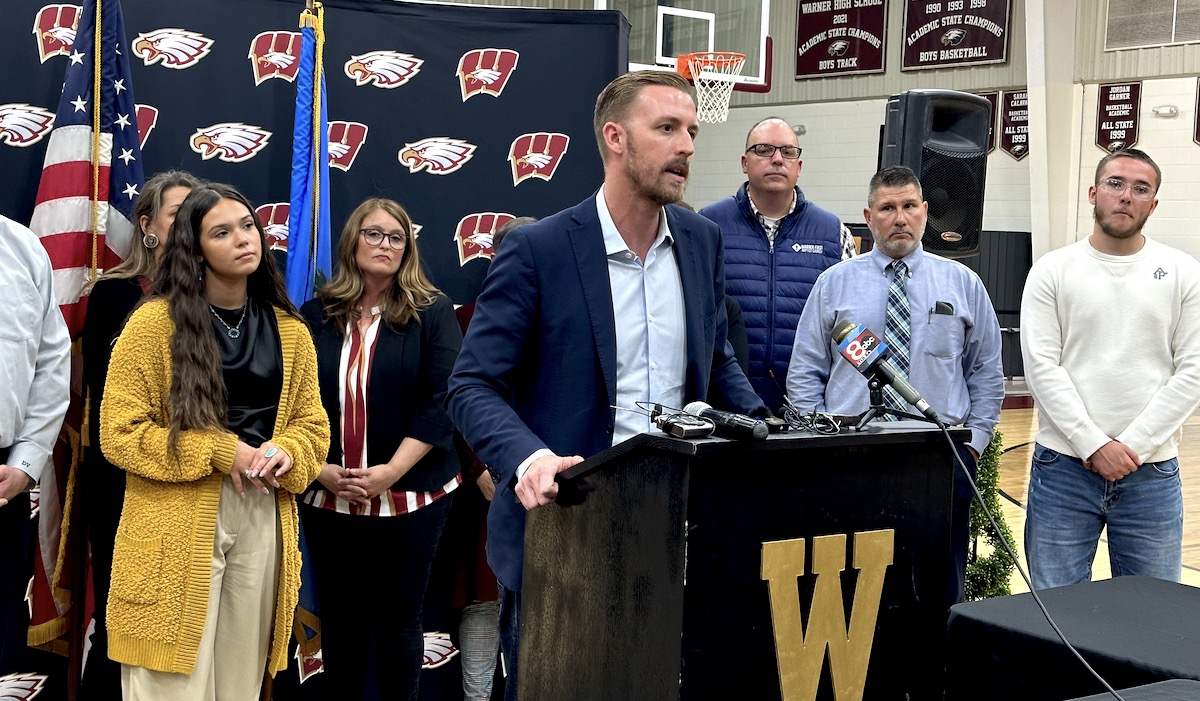
In three versions of a press release sent Jan. 4, State Superintendent of Public Instruction Ryan Walters touted the success of his teacher recruitment program that offered pre-K through third grade teachers up to $50,000 when they agreed to teach in certain areas for five years.
In the press release, OSDE spokesman Dan Isett said 523 teachers received bonuses as part of the program. Of those, 67 came from outside Oklahoma. About 395 teachers who received the bonuses signed on to teach in rural or high-poverty areas.
“Innovative solutions like the teacher bonus program are the key to getting Oklahoma schools back on the right track,” Walters said in the release. “Any fake controversy Democrats and Republicans controlled by the teachers unions try to drum up will not dim the overwhelming success of this program. Previous small-scale programs have not worked, so we had to disrupt the market clearly and decisively to invest in our high-need areas. We will continue to disrupt the status quo, introduce free market principles in our education system, and unleash to power of innovation to reward our best teachers and help our students achieve great things.”
Walters had previously said in a KOKH Fox 25 town hall live-streamed on YouTube that the department received 950 applications for the program. In one of Thursday’s press releases, Isett said 578 applications were eligible to receive bonuses.
The Tulsa World’s Randy Krehbiel wrote in a story Jan. 2 that Epic Charter School and Edmond Public Schools had 35 and 24 respective applications approved, the most of any districts. Other urban school districts also saw larger numbers of applications approved:
- Tulsa Public Schools — 20
- Putnam City Public Schools — 18
- Deer Creek Public Schools — 15
- Norman Public Schools — 15
- Oklahoma City Public Schools — 14
Krehbiel, who received the data as part of a records request relating to a recent subpoena served on the department, also reported that few “low-performing” school districts had teacher applications approved through the program.
NonDoc submitted an open records request to the department Aug. 4 seeking related records but has yet to receive a response.
Infinity Generation lawsuit against state still alive

On Thursday, an Oklahoma County District Court judge declined to dismiss a lawsuit filed against Walters and the State Board of Education but indicated that the plaintiffs — Infinity Generation Preparatory School — could have a steep hill to climb.
Infinity Generation, an Oklahoma City private school that serves about 25 students, filed the lawsuit after the state board voted in August to give the school a status of “nonaccredited” for the 2023-2024 school year.
The state board’s decision came after the Oklahoma State Department of Education recommended nonaccreditation owing to the fact that the school shut down halfway through the 2022-2023 school year, telling its students to find another school for the spring semester. Additionally, school leadership did not communicate with OSDE’s regional accreditation officer from mid-February through June, according to the department’s recommendation summary.
“Infinity Generation Preparatory School received a recommendation of ‘nonaccredited’ status from the accreditation division for the 2022-2023 (sic) school year,” OSDE deputy general counsel Andy Ferguson wrote in the summary. “The two reasons given by State Department of Education staff are failure to operate a school (more specifically closing the school for an entire semester) and a list of statutory and regulatory requirements that could not be verified due to Infinity’s lack of participation in the annual accreditation process.”
In his memo, Ferguson argued that schools are only accredited for one year at a time and that the department evaluates all Oklahoma schools’ accreditation statuses each year.
But the school’s principal, Gina Darby, and its attorney, Jim Johnson, argued that the department and board violated the school’s due process with their decision. In Infinity’s lawsuit, Darby and Johnson call the August meeting a “sham hearing” and allege that the board and Walters violated the Oklahoma Open Meeting Act and the Oklahoma Administrative Procedures Act.
After Thursday’s hearing that kept her litigation alive, Johnson also argued that the board had not properly created rules to govern private school accreditation.
“By the board not promulgating the rules to give notice and not clearly defining the differences between public and private schools (…) it allows the agency to act arbitrarily and capriciously and hurt people, not based on merit, but just because you find them to be a disfavored class of people in society,” Johnson told reporters after the hearing.
In her motion to dismiss, Assistant Attorney General Erin Moore — who is representing Walters and the board — argued that the State Board of Education is not required to give all of Oklahoma’s nearly 540 school districts a due process hearing when it makes accreditation renewal decisions.
Additionally, Infinity Generation can continue to operate as a nonaccredited private school. Private schools voluntarily apply for accreditation from the state board so they can be eligible for federal and state grants and tax credits. State statute allows private schools to accredit private schools “in like manner as public schools.”
Judge Don Andrews did not fully dismiss the case Thursday but he did give Johnson 30 days to amend Infinity’s petition and demonstrate that private schools should be treated separately from public schools in accreditation matters.
Epic motion hearing set for Friday

In other court news, the criminal case charging Epic Charter School’s co-founders and former chief financial officer with embezzlement was set to have a hearing Friday morning, but it was continued to Feb. 15.
Although neither Ben Harris, David Chaney nor Joshua Brock has actually entered a plea yet (their preliminary hearings having been rescheduled numerous times), the looming hearing involves the state’s motion for a temporary injunction or restraining order preventing the defendants from modifying assets currently held in a Bank of Oklahoma account.
Attorney General Gentner Drummond’s office — which took the case over from the Oklahoma County District Attorney’s Office on his first full day in office — argued in their motion that the injunction or restraining order was necessary because BOK had recently notified the state that it intended to close the account soon.
“In October 2022, the defendants utilized the embezzled funds maintained in Bank of Oklahoma ‘business advantage’ bank account (…) to acquire over $5 million in investment assets,” wrote Assistant Attorney General McKenzie McMahan. “These investment assets (…) were derived from or realized through a violation of the Oklahoma Racketeer-Influenced Corrupt Organizations Act as alleged in count one of the amended information, and they are subject to criminal forfeiture.”
In response, attorneys for Harris and Chaney argued they should be presumed innocent and that neither has actually entered a plea to the charges yet. Additionally, they argued that a lien filed the same day as the state’s motion against them regarding the account functions similarly to a possible restraining order or injunction.
Oklahoma County District Judge Susan Stallings was set to hear the arguments at 9 a.m. Friday before the hearing was continued to Feb. 15. After all parties make their arguments at the new hearing date, she could issue a ruling from the bench, or she could wait and decide the matter at a later date.
Politico: Conservative legal activist groups working to promote Oklahoma’s proposed religious charter school
As two lawsuits seeking to block the creation of what could be the nation’s first religious charter school continue to play out in Oklahoma County District Court and before the Oklahoma Supreme Court, Heidi Przybyla of Politico published an in-depth piece Dec. 29 exploring the tight-knit collection of national groups seeking to lay legal groundwork and push the school forward.
Przybyla connected the efforts in Oklahoma to a prominent conservative activist:
Behind the effort to change the law are Christian conservative groups and legal teams who, over the past decade, have been beneficiaries of the billion-dollar network of nonprofits largely built by (Leonard) Leo, the Federalist Society co-chairman.
Leo’s network organized multi-million-dollar campaigns to support the confirmation of most of the (United States Supreme) Court’s six conservative justices. Leo himself served as adviser to President Donald Trump on judicial nominations, including those of Justices Neil Gorsuch, Brett Kavanaugh and Amy Coney Barrett.
Leo’s multiple hats in recruiting judicial nominees, using his nonprofit war chest to promote their confirmations and then funding legal organizations to craft challenges to longstanding court precedents, has drawn increasing criticism.
“The Christian conservative legal movement, which has its fingerprints all over what’s going on in Oklahoma, is a pretty small, tight knit group of individuals,” said Paul Collins, a legal studies and politics professor at the University of Massachusetts Amherst. “They recognize the opportunity to get a state to fund a religious institution is a watershed moment,” said Collins, author of Friends of the Supreme Court: Interest Groups and Judicial Decision Making, adding that “They have a very, very sympathetic audience at the Supreme Court. When you have that on the Supreme Court you’re going to put a lot of resources into bringing these cases quickly.”
In Oklahoma, the legal team representing the state’s virtual charter school board, the Alliance Defending Freedom, helped develop arguments that led to the end of Roe v. Wade. It is significantly funded by donor-advised funds that allow their patrons to keep their identities secret but which receive large amounts of money from Leo-aligned groups.
They include Donors Trust, often called the “dark money ATM” of the conservative movement. In recent years, Donors Trust has been the largest single beneficiary of Leo’s primary dark money group, the Judicial Education Project. Donors Trust, in turn, gave $4 million to Leo’s Federalist Society in 2022, according to the IRS filings.
Read the full Politico article for more details.
Summer Boismier federal lawsuit moving forward
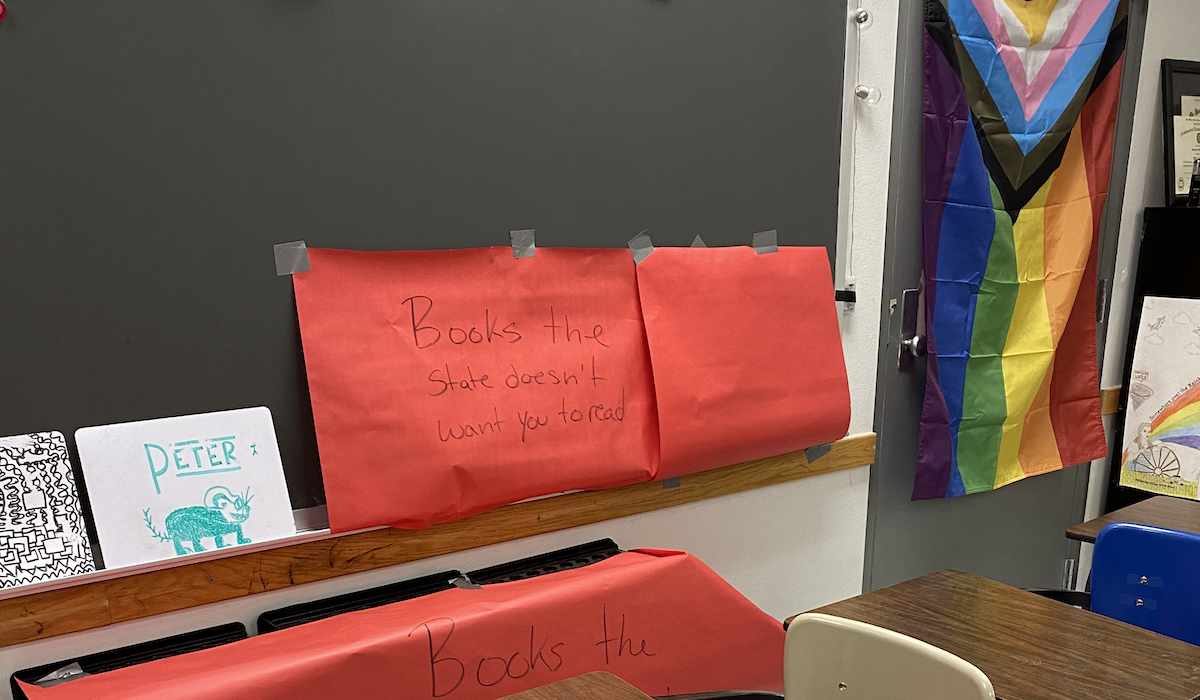
Former Norman teacher Summer Boismier’s federal lawsuit filed Aug. 30 against Walters seems to be moving forward after Walters was finally served Dec. 21.
Boismier had filed the suit alleging a number of things, including defamation and slander, after Walters criticized her for allegedly violating HB 1775, the state’s purported “critical race theory” ban.
But three months later, Walters had yet to be served with the suit, and U.S. District Judge Bernard Jones for the Western District of Oklahoma asked Boismier’s lawyer for a status update as to why the case was not moving forward.
Boismier’s lawyer, Brady Henderson, said in a court filing that he had declined to alert the court that Walters had not been served owing to “significant health issues” and the process server’s assertion that Walters is “notoriously difficult to serve.”
With the lawsuit now moving forward, Walters has yet to file a response to Boismier’s allegations yet, but lawyers Timothy Davis and Alexandra Williams with the Texas-based law firm Jackson Walker gave notice Thursday that they would represent Walters in the case.
Ringling High School principal enters no contest plea

Ringling High School principal and head football coach Phil Koons pleaded no contest last week to one count of misdemeanor outraging public decency in Jefferson County District Court.
Koons had been under investigation for allegedly regularly using profanity and verbally harassing his players. Molly Young and Murray Evans of The Oklahoman reported Wednesday that Associate District Judge Dennis Gay rejected a plea deal Koons had reached with prosecutors after hearing victims’ statements.
KFOR’s Kaylee Olivas posted screenshots of victim impact statements read in court.
“Players are cursed and belittled for missing practice. I was called a pussy when I missed practice because my mother was put in the hospital. I was told I didn’t deserve to play and humiliated in front of the team in the locker room after a game,” one player wrote. “The constant verbal and mental abuse had made some players depressed, anxious, and/or thinking about committing suicide. I have tried to be there for those going through these troubles. (…) One player would get upset after Phillip Koons would call him racial slurs. He felt targeted for his skin color, and we were upset seeing how much this hurt our teammate.”
After Gay rejected the plea deal, which would not have required jail time but would have required Koons to relinquish his teaching certificate for seven years, Koons is expected to be sentenced March 12. He faces up to a year in jail and up to a $500 fine. Although it is unclear if he has been suspended following his no contest plea, Koons is still listed on Ringling’s website as the school’s principal.
OSU, Stitt’s office release emails from Katherine Curry
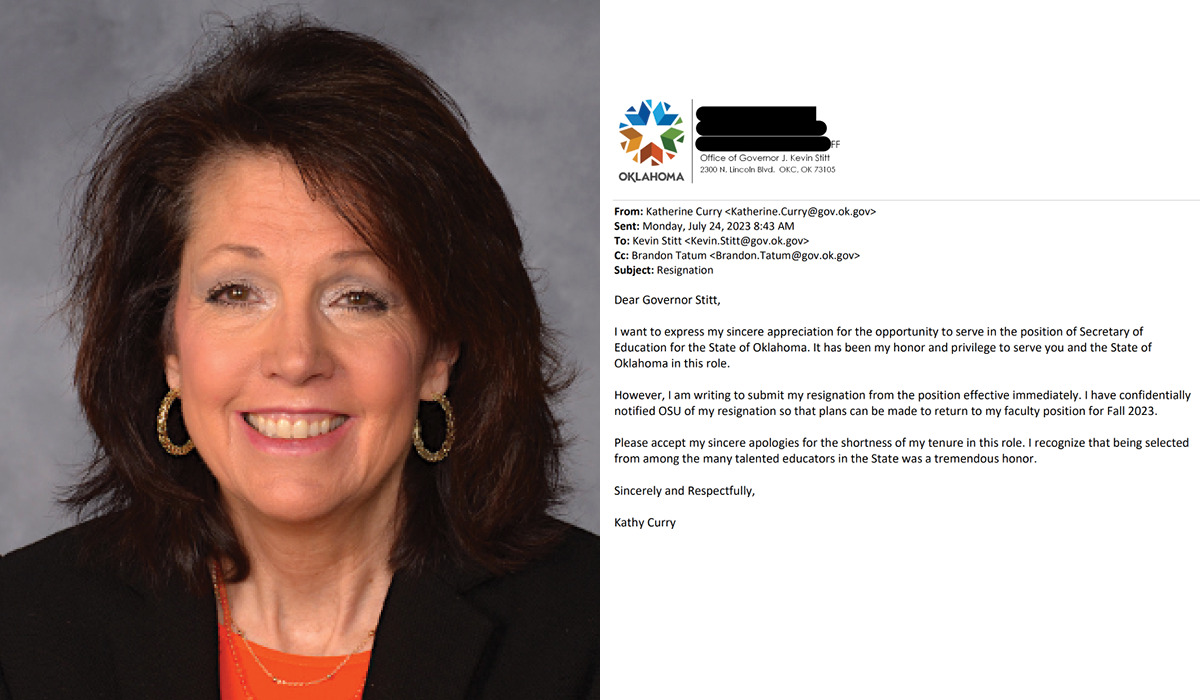
When former Secretary of Education Katherine Curry stepped down from her position after just three months, she cited the “complexity and political environment” of her position as reasons for her resignation.
Months later, Nuria Martinez-Keel and Carmen Forman of the Oklahoma Voice reported Nov. 2 that Curry resigned after she was unable to get budget information from Oklahoma State Department of Education officials.
“I just needed information,” Curry told Oklahoma Voice. “I never received information.”
Curry told Martinez-Keel and Forman that a lack of financial data was “100 percent” the reason for her resignation. Cabinet secretaries are required to sign off on expenses over a certain amount, a task that Curry may have found more concerning amid investigations into Walters’ prior oversight of federal funds.
OSDE spokesman Dan Isett said at the time that the department had no data available to give to Curry because of a lack of financial oversight when Walters took over.
Martinez-Keel’s and Forman’s reporting relied in part on emails they received as part of an open records request from the governor’s office.
NonDoc made requests for Curry’s emails from her time as Secretary of Education to the governor’s office and OSU in August. Curry was an OSU professor before becoming Secretary of Education and returned to OSU when she resigned.
The governor’s office request was completed Dec. 27. The request to OSU was fulfilled Jan. 5. Although the emails released by the two offices in response to the requests do not show the full extent of Curry’s requests for financial information detailed by the Oklahoma Voice, one email shows Curry asking OSDE’s chief financial officer for information weeks before she resigned.
“I am writing to request a copy of the most recent balance sheet and income/expense statement for the fiscal year ending June 2023. I would also like to request a comparison to the 2023 fiscal year budget,” Curry said in an email to Mathangi Shankar on July 5. “Lastly, could I please see a copy of the 2024 fiscal year budget? When was the most recent audit and are there any audits in progress or anticipated? If an audit has been conducted, may I please have a copy of the audit findings?”
No reply to Curry’s request was included in the emails NonDoc received.
The bulk of emails NonDoc received show back-and-forth communications between Curry, OSDE and the Office of Educational Quality and Accountability regarding a data-sharing contract that had been awaiting final signatures for a year.
In a June 29 email to an the OSDE chief of staff with Curry and Walters copied, OEQA interim executive director Renée Launey-Rodolf expressed frustration with the contract delays.
“I don’t want to come across as impatient or ungrateful, but each time we have inquired about the status of the MOU we have received the same message — its being reviewed by legal. This has been the case since last summer,” Launey-Rodolf wrote. “We readily welcome the opportunity to review a redlines Word document regarding any potentially problematic terminology so that this agreement can move forward. Please let us know if there is anything that we can do on our part to expedite this.”
Jenna Thomas, OSDE’s chief of staff, responded, “We’ll get it across the finish line.”











